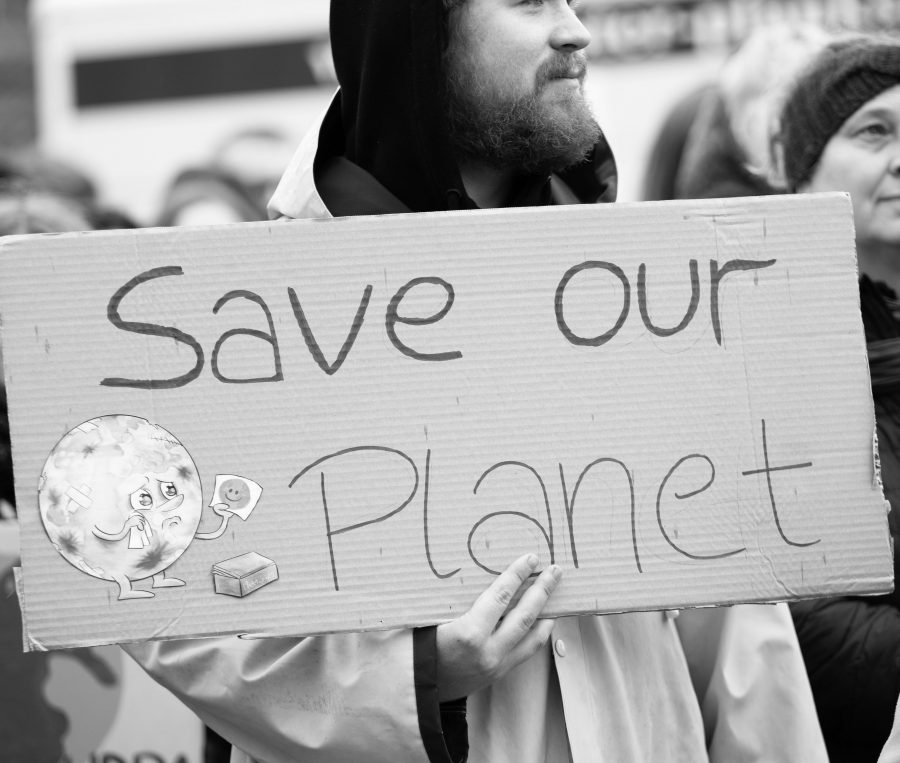The choice, apparently, is simple: capitalism or the planet.
In a television clip that quickly went viral last week, Guardian columnist George Monbiot said that the way to prevent climate breakdown was to “change the system”:
We have to overthrow this system which is eating the planet with perpetual growth. I mean since when was GDP a sensible measure of human welfare? And yet everything that governments want to do is to try to boost GDP. Now people like the OECD or the World Bank go ‘oh we’re not asking for a lot of growth just 3 percent a year’. That means doubling in 24 years. We’re bursting through all the environmental boundaries and screwing the planet already. You want to double it? Double all that? Double it again, keep doubling it?
It’s madness. We’ve got to find a better way of measuring human welfare than perpetual growth. We’ve got to start ramping down all fossil fuel production and leave fossil fuels in the ground… We’ve got to go straight to the heart of capitalism and overthrow it.
This revolutionary call to arms was met with applause from the BBC studio audience and even tweeted with approval by no less than Hollywood funnyman James Corden.
The sentiment is echoed by those environmental protestors gluing themselves to lorries and camping out on some of London’s main arteries as part of the Extinction Rebellion protests this week.
In one leaflet distributed at the protests, an organisation called the Green Anti-Capitalist Front accuses capitalism of “killing the earth”, stating: “We believe that without the imposed scarcity of capitalism and the alienation and isolation it causes, we would be able to build communities which fulfil everybody’s needs while reducing our environmental impact to a manageable level… the option is clear: a future where we can flourish, or a capitalist-induced hellscape awaiting us if we do nothing.”
Even those who take a far less radical approach to the issue would generally accept the assumption that a healthy environment and capitalism are in opposition to one another.
Hardliners like Monbiot are at least consistent in their opposition to growth. In 2007, he wrote “I hope that the recession now being forecast by some economists materialises.” (I doubt those enthusiastically sharing his anti-capitalist monologue on social media fully realise the logical conclusion of the platitudinous sounding claim that we are too focused on growth.)
The pain caused by slower growth or a shrinking economy, Monbiot argues, will be nothing compared to the suffering caused by climate change. It is possible to take issue with this strain of environmentalism on its own terms. But the mistake is bigger than getting the maths wrong.
Not only does this hardship calculus ultimately depend on knowing unknowable things, it also misses the point — because Monbiot and those like him have misunderstood the relationship between capitalism, growth and the environment.
Their first mistake is confusion, either sincere or disingenuous, about what it is they are really against. Their assumption is that capitalism is uniquely preoccupied with growth. But the truth is that more or less every deviation from market exchange and private property has been at least as obsessed with GDP, if not more so.
The difference is that they just haven’t been as good as capitalism at delivering that growth. Or at least delivering it without also subjecting millions to authoritarianism and starvation. The Soviet side of the Iron Curtain was also responsible for more than its fair share of environmental disasters.
Ultimately, the hardliners’ quarrel isn’t with capitalism per se, but with human progress. You can measure that progress in GDP. Or you can measure it in the longer, healthier, happier, safer, more fulfilling and rewarding lives that more and more people now live.
That progress has brought with it greenhouse gas emissions and, yes, man-made climate change.
But the counterintuitive truth is that the progress which helped create the problem is what will solve it.
The quicker the progress in energy technology, the sooner we can rely on cleaner alternatives to fossil fuels.
The quicker carbon-intensive economies like China develop, the sooner they find ways of creating wealth and prosperity without burning as much coal. In fact, thanks to its rapid growth, Chinese coal consumption has been falling since 2013.
The quicker the growth of the world’s poorest countries, the sooner birth rates fall and the more likely we are to undershoot population projections that some of the world’s most prominent environmentalists think will spell ecological disaster.
As my colleague Eamonn Ives recently pointed out on CapX, the relationship between economic growth and the health of the environment more generally is well-established. In a well-known academic paper published in 1994, Gene M. Grossman and Alan Krueger (who sadly died last month) found that countries growth initially means environmental deterioration, but that once GDP reached $8,000 per capita, more growth leads to a cleaner environment.
In other words, growth, innovation and development aren’t the problem. They are the solution. Just as capitalism, and the goods it has delivered, mean we are now able to mitigate against and protect ourselves from the elements in ways we were once unable to, they are our best hope for the tools we need to limit and defend against climate change.
None of this is to say that policymakers should just sit back and do nothing. But interventions to combat climate change should work with, not against, the grain of the market and human nature. That might mean internalising the external costs of emissions with a carbon tax. Or finding ways to boost the incentives for those businesses and entrepreneurs risking their capital to find solutions to environmental problems.
Climate change is indeed a grave and urgent issue. So grave and so urgent, in fact, that it we will need to use the most effective tool we have to harness human ingenuity. That tool is the market. And without it, the fight against climate change is doomed.








